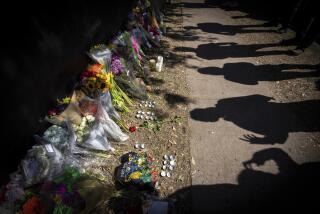Sept. 11 Payout Conundrum
- Share via
“I do not really expect to ameliorate anybody’s pain,” says Kenneth Feinberg, who runs the huge federal fund for those whose family members were killed in the World Trade Center or Pentagon. “A check won’t do that.” But as he works out the fund’s details, Feinberg can either make the coming years easier for these families or add to their anguish.
Congress created the fund 10 days after the terrorist attacks, as part of the airline bailout bill. Its goal is to help thousands of families quickly, without requiring them to hire a lawyer or file a lawsuit. Congress hasn’t yet appropriated money for the fund, and the legislation is but a bare-bones guide to how the plan will work. Survivors of the tragedies or the families of those who were killed can apply for compensation from the fund. If they do, however, they waive their right to sue the airlines, owners of the World Trade Center or a raft of other possible defendants.
The fund opens for business Friday--and the first awards will be announced 120 days later. But before the first payout, Feinberg, a lawyer who has helped settle mass injury cases involving exposure to Agent Orange and radiation, will have to settle on a process for determining how much each claimant should get. Congress didn’t make his task easy. The legislation tells him to consider the economic loss caused to each victim, how much that person was earning and what the lifetime earnings might have been.
But is it fair when the family of a $400,000-a-year stock trader will probably receive vastly more than survivors of a secretary? How much more should taxpayers contribute to support a family with a monthly mortgage of $8,000 than one in a shabby apartment in Queens? Isn’t the devastation suffered by families who have lost loved ones and breadwinners more alike than different, regardless of their incomes or living standards?
Feinberg can ease suffering for all the families and reduce resentment by muting such disparities. Congress rightly directed that other payments, such as from life insurance, be deducted from each victim’s federal award. But in the first days after the attack, when this bill was hastily drafted, no one imagined that Americans would donate some $1.3 billion to the relief effort. Feinberg should make sure that these donations work to balance the disparities. Perhaps he could devise a sliding scale so that if a family gets an additional charitable payment of, say, $100,000, the award is not counted against it if it’s too poor to reap big bucks from the federal fund.
He must also make sure that the claim procedure itself doesn’t magnify the awards’ potential inequities. Congress allowed victims to have lawyers represent them in applying to the fund. But those who can’t afford a lawyer shouldn’t walk away with less money. If the rules that govern its operation are fair and transparent, this fund can also be a model for resolving future mass injury claims.
More to Read
Inside the business of entertainment
The Wide Shot brings you news, analysis and insights on everything from streaming wars to production — and what it all means for the future.
You may occasionally receive promotional content from the Los Angeles Times.










